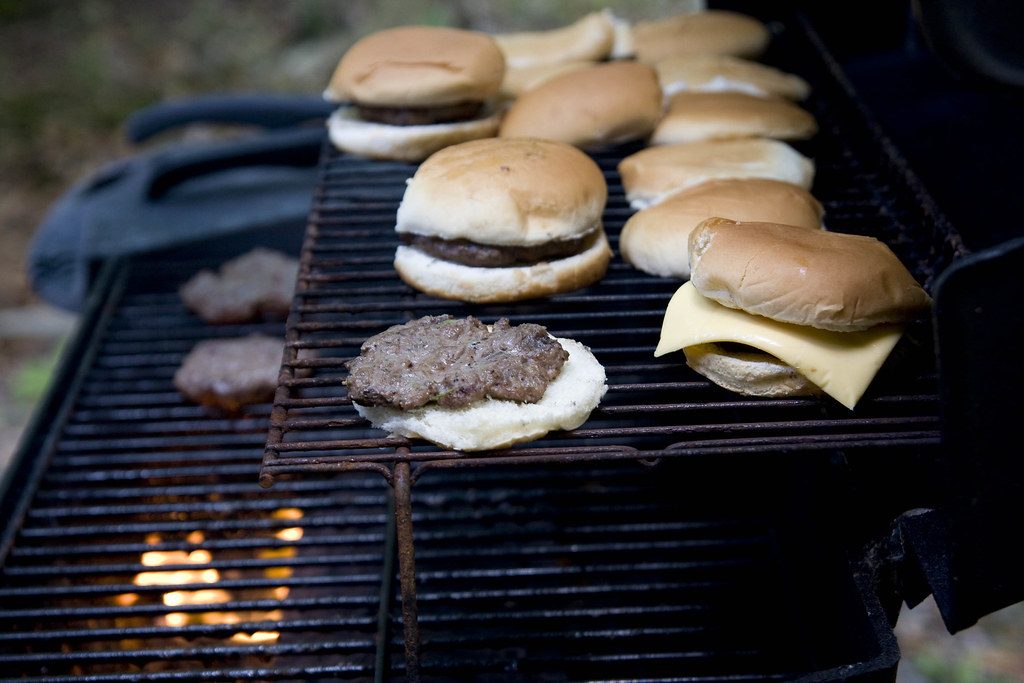
Summertime is the time to grill. But grilling is made for sharing, and who better to share all that scrumptious yumminess with than friends and family at a picnic? Afterwards it’s card games, tossing a Frisbee around, a dip in the pool, telling inside jokes, and…
Food poisoning?
No one wants food poisoning on the menu. Here are some tips for avoiding it at your summer grill-a-thon.
-
Keep raw meat and cooked meat separate.
It’s tempting when you don’t want to add to the already looming pile of dirty dishes. But don’t use a plate to transport raw meat to the grill, then use the same one to bring the cooked meat back in (unless you wash it first). Here’s why: grilling meat to the proper internal temperature (more on that below) kills harmful bacteria that may be in them. But when you place the now cooked meat back into the raw juices still on that plate, you negate that. Which means any potential contamination is now on the food you and everyone else is about to eat.
-
Cook meat to the correct internal temperature.
No one’s saying you have to cook your steak until it’s like leather. But cooking it very rare may not give the meat a chance to heat up enough to kill any harmful bacteria. The CDC put together a handy chart which tells you the recommended cooking temperature for various types of meat, found here: https://www.foodsafety.gov/food-safety-charts/safe-minimum-cooking-temperature. These temperatures are measured using a meat thermometer and can help make sure food is safe to consume.
-
Keep colds cold and hots hot.
Keep cold food cold and hot food hot. Bacteria that can cause food poisoning like to grow between 40° F and 140° F. This means it’s best to keep foods meant to be cold at 40° F or below and foods meant to be hot at 140° F or above. The CDC has a website with handy tips on how to do that here: https://www.foodsafety.gov/blog/2018/12/keeping-hot-foods-hot-cold-foods-cold.html. Pro tip: foods can sit out for a maximum of two hours before they should be put away.
-
Wash your hands, grill master.
It seems so simple, yet it doesn’t always happen. If you’re doing the cooking, make sure to properly wash your hands, especially after you’ve handled raw meat. That means rubbing soapy hands together under warm water. If a sink isn’t readily available, use alcohol-based hand sanitizer instead.
-
Refrigerate leftovers promptly.
Want to enjoy some leftovers over the next few days? No problem. Get them moved to the refrigerator quickly. According to the Mayo Clinic leftovers from the refrigerator can be safely eaten up to four days after they were originally cooked. Of course, if there’s ever a doubt, it’s best to throw it away.
Want to enjoy some leftovers over the next few days? No problem. Get them moved to the refrigerator quickly. According to the Mayo Clinic leftovers from the refrigerator can be safely eaten up to four days after they were originally cooked. Of course, if there’s ever a doubt, it’s best to throw it away.
You’ve done everything right, you enjoyed the food, you made great memories with friends and family. Then your stomach rumbles in a weird way. The rumbling eventually progresses to cramping, nausea, diarrhea, vomiting, or some combination of those. What now?
-
Fluids, fluids, fluids.
You can survive for weeks without solid food, but only a few days without water. Drink as much fluid as you can. You can alternate between things like water, sports drinks, and juices. Best to avoid citrus juices. And don’t forget your grandmother’s advice: chicken noodle soup is good for what ails you.
-
Rest.
Most food poisoning goes away on its (miserable) own without need for intervention. Resting allows your body to do its job getting rid of the infection.
-
If you can’t keep anything down all day, it’s time to see your doctor.
Dehydration is the deadliest part of food poisoning. If you can’t keep anything down, it’s time to make a visit to a healthcare professional. There are several medications on the market which can help settle your stomach enough to keep fluids down. In severe cases, you may need IV fluids.
Here’s to a food poisoning-free season of picnics, grilling, and laughter, from us here at GIH to all of you!

Share This